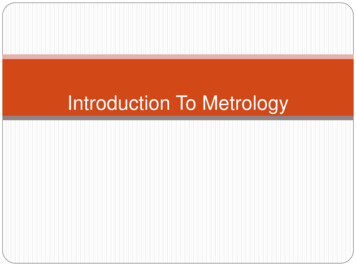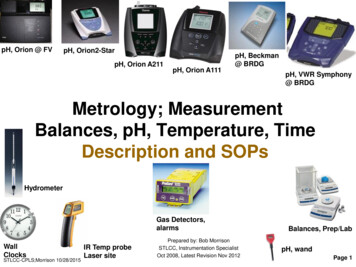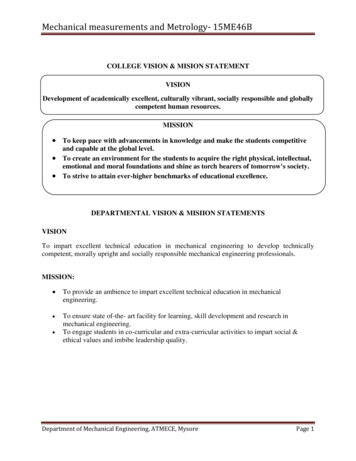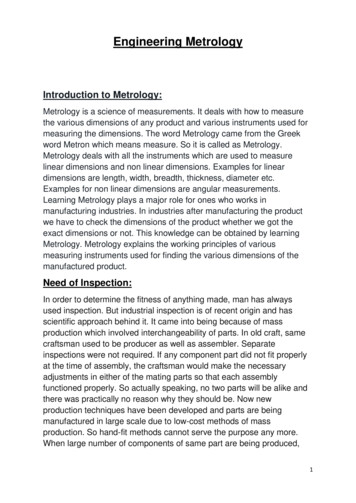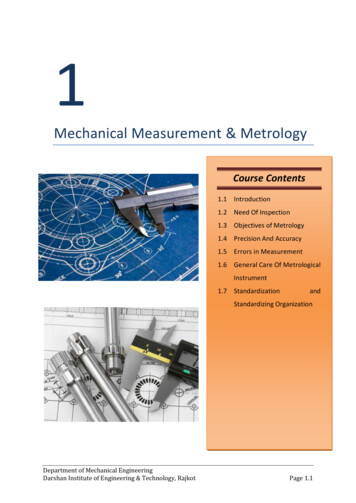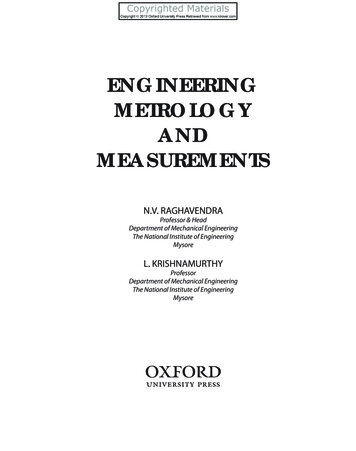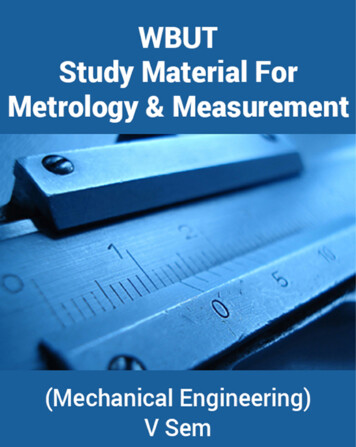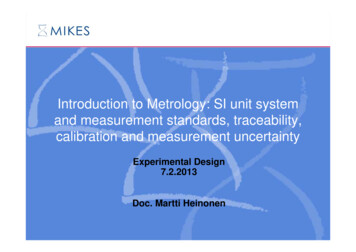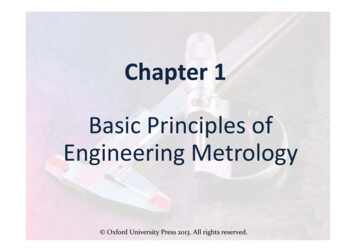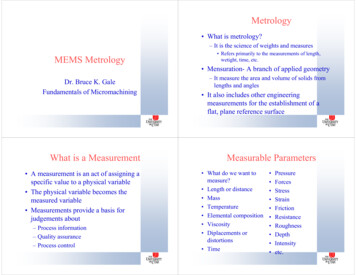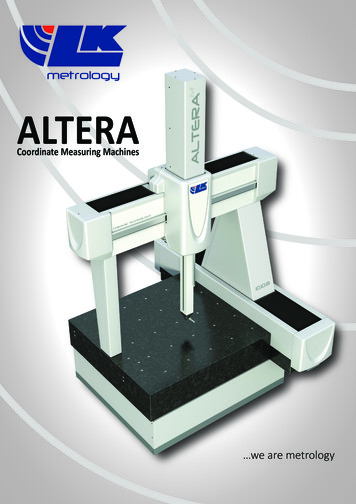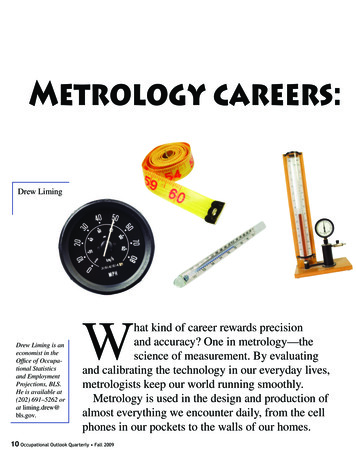
Transcription
Metrology careers:Drew LimingDrew Liming is aneconomist in theOffice of Occupational Statisticsand EmploymentProjections, BLS.He is available at(202) 691–5262 orat liming.drew@bls.gov.What kind of career rewards precisionand accuracy? One in metrology—thescience of measurement. By evaluatingand calibrating the technology in our everyday lives,metrologists keep our world running smoothly.Metrology is used in the design and production ofalmost everything we encounter daily, from the cellphones in our pockets to the walls of our homes.10 Occupational Outlook Quarterly Fall 2009
Jobs for good measureBut it isn’t always easy to classify theworkers who apply metrology in their jobs.Metrology workers are employed in a varietyof industries and have different job duties.For example, both scientists conductingresearch in a laboratory and technicianssupervising production on a factory floormight rely on knowledge of metrology. Andbecause metrologists come from diverse educational backgrounds, many learn their skillson the job.This article introduces metrology asa career field. The first section defines thedifferent types of metrology. The next sectiondescribes five industries in which metrologists are employed and some of the work theyperform in each. The third section discussesskills and training metrologists often have,along with some of the ways they typicallyadvance in their careers. Sources of additionalinformation are provided at the end.Types of metrologyIn the United States, metrology standards aredetermined by the National Institute of Standards and Technology.There are three different types of metrology: scientific, legal, and industrial. ScientificFall 2009 Occupational Outlook Quarterly11
metrology focuses on developing new systemsof measurement and standardizing existingones. Legal metrology is concerned with regulating measurements and measuring instruments related to public policy issues, such aspreserving public safety and health. Industrialmetrology applies the principles of measurement science to manufacturing.Workers in scientific and legal metrology are usually employed by governmentagencies. But most metrology workers havejobs in industrial metrology, where they testnew products for private companies as wellas for government. For example, an industrial metrologist working in the automobileindustry may design an evaluation for a car’scrash detection system. And another industrialmetrologist, employed in government, mightverify that the system works correctly.12 Occupational Outlook Quarterly Fall 2009Classifying metrology jobs is difficultbecause of these workers’ varied skills,educational levels, and positions. There arealso some occupations in which metrologyskills are only part of the job: An electronicsengineer designing microchips, for example,might occasionally perform metrology tasksbut has many other duties as well.And metrology workers may have different titles, depending on their industryand employer. Other job titles might includecalibration engineers, calibration technicians,quality engineers, quality technicians, processcontrol technicians, and safety engineers.Metrology at workBecause metrology work is often interspersedwith other job duties and occupational titles,the U.S. Bureau of Labor Statistics (BLS)does not collect employment orwage data specifically on metrologists. Metrology, however,is critical to the success of manydifferent industries. Metrologistshelp to develop technology bydesigning or performing tests todetermine a product’s effectiveness. They also calibrate existingdevices, such as fuel gauges orradio antennas, to keep them inworking order.There are many industriesthat employ metrologists. In thefollowing industries, descriptions of metrology work providea glimpse of the broad range ofprojects that rely on the scienceof measurement.Aerospace. Complexmachinery like airplanes requires metrology workers toconsider both function and safety.Metrologists in aerospace supervise the manufacture of planesand are responsible for testingtheir components, including turbines and landing gear. Calibration technicians also regularlycheck the assembly process to
ensure that the machinery is functioning correctly.Metrologists’ contributionsto the aerospace industry extendbeyond structural assembly. Forexample, the instruments in acockpit, such as the navigationsystem and altimeter, are subject to metrologists’ review andcalibration. Metrology also helpsto ensure the safety of passengersinside the plane. Fabric in theplane’s cabin is designed to befire resistant, and metrologists setstandards for measuring flammability and help test and developnew flame-retardant products.Communications. Withoutmetrology, dependable and securedigital networks couldn’t exist.In computer network security,for example, metrologists thwarthackers by developing new programs to measure network activity and flag suspicious actions.Cell phone production alsobenefits from metrology work.Metrologists help test the phones’numerous components, recording under what circumstances thephones can function.Construction. Metrology aids the construction industry in a number of ways.Metrology tools developed for buildingmanagers help them determine the costeffectiveness of worksite decisions. Byresearching new methods to automate theconstruction process, metrologists help reducelabor costs. And the production of cheaper,more resistant building materials relies onmeasurement science.Metrologists also are involved in buildingdesign and may study structural durability. Tohelp guide construction standards, metrologyworkers develop tests to evaluate a structure’sresistance to daily stress from both people andthe environment. For example, metrologistscreate trials to measure a home’s resistance toearthquakes and fires.Energy. All energy companies rely onthe work of metrologists. Every building hasa meter that displays its energy consumption,and calibration technicians ensure that thesemeters provide accurate readings. Consumption measurements are the underpinning ofthe energy industry; without them, energycompanies wouldn’t be able to charge customers by use.In a power plant, calibration techniciansare also needed to continually verify its manygauges and measurements. The potential consequences of a power plant failure range fromloss of electricity to nuclear meltdown.Metrologists are also involved in “green”energy. They help develop wind turbines andsolar panels by testing energy output and construction methods. And metrology is criticalfor measuring the power consumption of newenergy-efficient household appliances.Fall 2009 Occupational Outlook Quarterly13
Healthcare. For many patients, the properfunctioning of medical devices is a matter oflife and death. And metrologists are requiredto calibrate and certify medical devices, suchas external pacemakers and fetal monitors.By fine tuning machinery, metrology workersensure the accuracy of medical tests to allowfor the best possible diagnoses.Skills, training, andadvancementWorkers in metrology often follow indirectcareer paths to their jobs. There are, however,some skills and training common to workersin metrology occupations. And experiencemay lead to increased responsibilities in othermetrology work.14 Occupational Outlook Quarterly Fall 2009Skills. Highly skilled metrologists—thosedeveloping new tests and product designs inlaboratories—must be proficient in mathematics, the sciences, and engineering. They mustalso have excellent communication skills,because they often work on teams with otherresearchers and scientists.Metrologists at the technician level needmechanical aptitude. Technicians also must beable to maintain high levels of concentrationwhile making slight, precise adjustments toequipment.Training. Unlike other sciences, metrology has a relatively low profile with few formaleducation programs. There are several degreeprograms for metrologists at the associatedegree level. Some 4-year universities offermetrology specializations in their engineeringdepartments.Many metrologists who have a bachelor’sor higher degree study a science or engineering discipline other than metrology. Someresearch metrologists, for example, mighthave a physics or mechanical engineeringdegree. Others have a degree specific to theindustry in which they are employed; forexample, metrologists working in the aerospace industry might have a degree in aerospace engineering.Metrologists at the technician level usually don’t need a degree. Most have a highschool diploma and receive on-the-job training. The U.S. military also offers many training programs in the study of metrology.Advancement. Assuming more responsibility in jobs related to metrology, like jobsin many fields, often depends on gainingexperience. Technicians may advance to moresophisticated metrology jobs with experienceand instruction, including through formal orinformal mentorships. For example, a qualitycontrol technician working on a factory floormight be coached to consider more complexdesign issues.Mid-level metrologists might work astechnicians or scientists, but either workermay find advancement to other metrologyrelated jobs. Because of their expertise, the
most experienced usually work as managersor supervisors of other metrologists.American Society for QualityFor more informationMilwaukee, WI 53203To learn more about careers in metrology,refer to the BLS Occupational OutlookHandbook. As mentioned previously, BLSdoes not collect employment and wage dataspecifically on metrologists. However, dataare available for some other occupations thatmay include performance of metrology tasks,such as inspectors, testers, sorters, samplers,and weighers (see www.bls.gov/oco/ocos220.htm) and engineering technicians (see www.bls.gov/oco/ocos112.htm).The Handbook is available in many publiclibraries. Online, visit www.bls.gov/ooh.Some associations that might providemore information on metrology work andeducation include the following:National Institute of Standards andTechnology100 Bureau Dr.Gaithersburg, MD 20899(301) 975–6478inquiries@nist.govwww.nist.govToll free: 1 (800) 248–1946600 N. Plankinton Ave.help@asq.orgwww.asq.orgNCSL International2995 Wilderness Pl., Suite 107Boulder, CO 80301(303) 440–3339info@ncsli.orgwww.ncsli.orgCal Lab MagazinePO Box 871270Vancouver, WA 98687(360) l 2009 Occupational Outlook Quarterly15
metrology focuses on developing new systems of measurement and standardizing existing ones. Legal metrology is concerned with regu-lating measurements and measuring instru-ments related to public policy issues, such as preserving public safety and health. Industrial metrology applies
